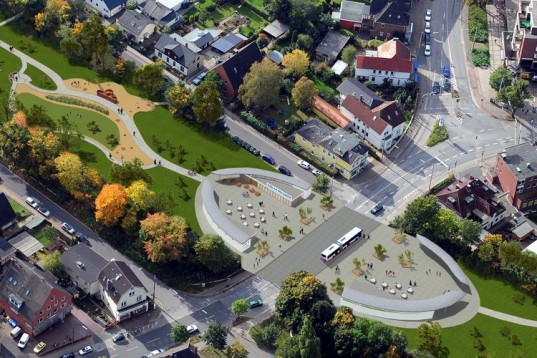 Hamburg is currently working on a plan that would eliminate the need for cars within the next 15-20 years, making the city a greener, healthier and more pleasant place to live. The city’s proposed Grünes Netz, or “Green Network” will create pedestrian and cycle paths to connect the city’s existing, substantial green spaces, and provide safe, car-free commuter routes for all residents.
Hamburg is currently working on a plan that would eliminate the need for cars within the next 15-20 years, making the city a greener, healthier and more pleasant place to live. The city’s proposed Grünes Netz, or “Green Network” will create pedestrian and cycle paths to connect the city’s existing, substantial green spaces, and provide safe, car-free commuter routes for all residents.
Hamburg’s Green Network will be constructed over the next 15-20 years, and it will create car-free paths between all major parks, playgrounds, community gardens, and cemeteries in Hamburg. The resulting network will cover 40% of Germany’s second-largest city, and it should enable commuters and tourists alike to navigate the once-car-dependent city entirely by bicycle and on foot.
The goals of the Green Network are multiple. On one end, Hamburg recognizes the need to change in the face of global warming; in the past 60 years they city’s median temperature has increased by 1.2 degrees Celsius to 9 degrees Celsius, and sea levels have risen by 20 centimeters—and they’re expected to increase another 30 centimeters by 2100. While a car-free city will undoubtedly do much to lower C02 emissions, the expanded green spaces that will fall along the new, green paths will also help to alleviate flooding in the event of heavy rainfall or superstorms.
Additionally, such a network will contribute to the overall health of the city and its inhabitants. The Guardian explained that Hamburg “envisions a network that doesn’t just help residents get from point A to point B in a sustainable fashion,” with city spokesperson Angelika Fritsch adding “It will offer people opportunities to hike, swim, do water sports, enjoy picnics and restaurants, experience calm and watch nature and wildlife right in the city. That reduces the need to take the car for weekend outings outside the city.”
Hamburg’s Green Network is part of a growing trend, particularly within Europe, to create comprehensive cycle networks that encompass not only city centers and ring-roads, but that also connect the city with the suburbs. Copenhagen has undertaken perhaps the most ambitious of these plans with the construction of 26 bicycle “superhighways,” that extend out from the city center as part of the city’s goal to become carbon neutral by 2050.
The extent to which Hamburg’s plans actually come to pass, however, is another question. What about large deliveries, emergencies, transportation for handicapped persons or travel during very bad weather, for example? As Michael Sivak, a professor at the University of Michigan Transportation Research Institute, told BBC, absolutely zero cars is probably not a literal or realistic goal, but “it is good to have a target that you are driving towards.”